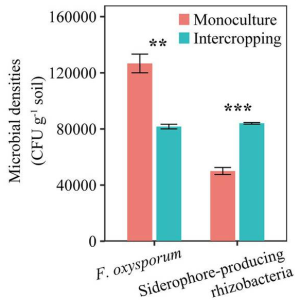A group from Key Laboratory of Plant-Soil Interactions, China Agricultural University, Beijing, China, etc. has reported that high bacterial diversity and siderophore-producing bacteria collectively suppress Fusarium oxysporumin maize/faba bean intercropping.
https://www.ncbi.nlm.nih.gov/pmc/articles/PMC9389221/
It is generally known that global food production is subject to various threats, in which soil-borne pathogens account for approximately 20% of yield losses. Intensive large-scale monocultures are prone to disease outbreaks, which cause yield losses. Fungal disease can be effectively controlled by sustainable diversified cropping systems such as rotations and/or intercropping.
In this study, three planting patterns were compared:
(1) monocultured maize,
(2) monocultured faba bean, and
(3) maize/faba bean intercropping.
As a result, intercropping increased the yields of maize and faba bean over monocropping by 21.3 and 14.4%, respectively, intercropping significantly decreased the gene copies of Fusarium oxysporum over monoculture by 2.91, 7.33 and 9.56% in bulk soil, rhizosphere soil and root endosphere, respectively, and the suppression of F. oxysporum was much stronger in faba bean than in maize.
From the analysis of bacterial diversity and community composition, the followings were highlighted:
(1) rhizosphere bacterial diversity and network connections are enhanced in the intercropping, which correlates the decrease of Fusarium oxysporum,
(2) Number of siderophore-producing rhizobacteria in rhizosphere of maize and faba bean was inversely correlated with the the abundance of Fusarium oxysporum.

